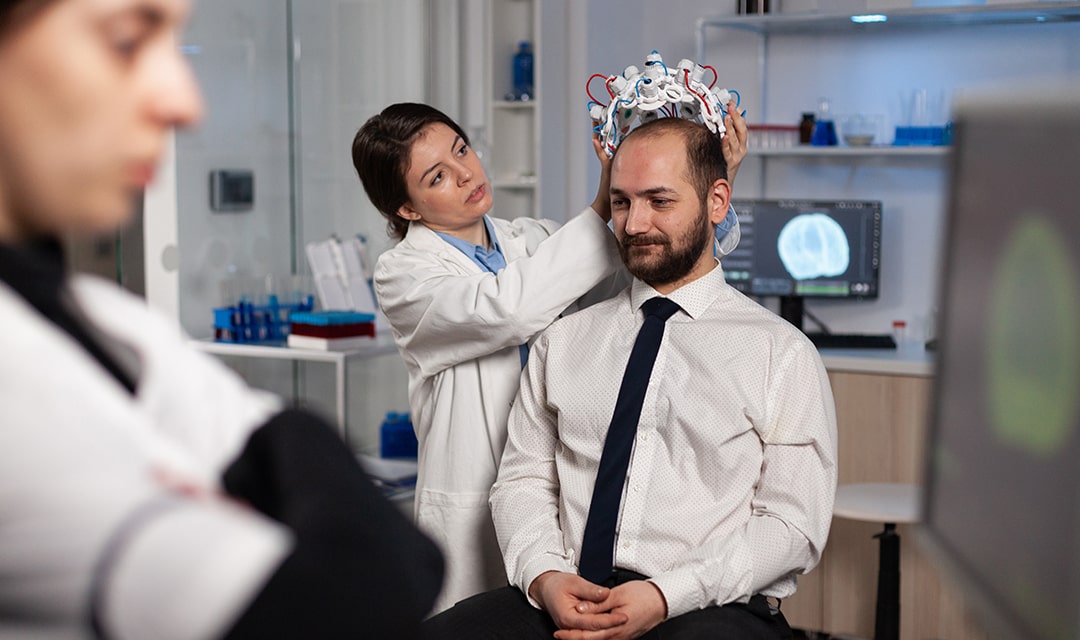Insight Neurosurgery –From Alzheimer’s and Parkinson’s disease to strokes and chronic nerve pain, millions of Americans are affected by a neurological condition each year, making this one of the leading causes of disability and death nationwide. If you or a loved one are experiencing a neurological disorder, it’s likely you have seen the terms neurologist and neurosurgeon used interchangeably. But did you know that there are distinct differences between the two disciplines? To help you better understand how specialists treat conditions affecting the brain, spine, and other parts of the peripheral nervous system, the following is a brief overview of neurology vs neurosurgery – including a guide for when to see a neurologist or neurosurgeon.
Neurology vs Neurosurgery for Brain, Spine, and Peripheral Nerves
The main difference between neurology and neurosurgery is how brain, spine, and other neurological conditions are treated with or without invasive interventions. If you are unsure who to see, a visit to your primary care physician is often a good starting point. They can help you determine the source of your problem, recommend the right specialist, and coordinate your care with the specialist based on your medical history. If you have a condition your primary care physician is unable to treat or you would like a second opinion, you may need to see a neurologist or neurosurgeon.
What Does a Neurologist Do?
A neurologist specializes in diagnosing and treating a wide range of conditions related to the nervous system, including the brain, spinal cord, and peripheral nerves. Patients usually see a neurologist after a referral from their primary care physician if they are experiencing severe pain or chronic symptoms that require further testing or treatment. Neurologists typically evaluate, diagnose, and offer non-surgical options to manage symptoms. Unlike a neurosurgeon, a neurologist does not perform surgical procedures, except neuro-interventionists who perform endovascular procedures and critical care neurologists.

What Does a Neurosurgeon Do?
A neurosurgeon is usually the next step when non-surgical treatment is no longer effective. Working closely with primary care physicians, neurologists, and emergency room doctors, neurosurgeons specialize in treating conditions that require surgical intervention. Often specializing in a particular area of interest such as stroke, brain tumors, or other complex neurological conditions, neurosurgeons also have extensive training in minimally invasive procedures, imaging, and other advanced technologies. They also treat a varied subspeciality of cases involving neurotrauma, functional neurosurgery, surgical treatment of vascular lesions, and neuro-oncology.

When Should I See a Neurologist?
You Have Been Diagnosed With a Neurological Condition
If you have been diagnosed with a neurological condition such as chronic migraines or multiple sclerosis, a neurologist will play a key role in monitoring your condition and ensuring you are receiving the best possible care. To manage the progression of your symptoms, a neurologist can prescribe medications and coordinate care between other healthcare providers like physical therapists.
Your Headaches Worsen or Won’t Go Away
Neurologists specialize in treating frequent or severe headache pain caused by migraines, tumors, or other neurological conditions. Throbbing pain, light sensitivity, nausea, dizziness, and vision problems are all reasons to seek medical attention. A neurologist will assess your symptoms, determine what is causing the chronic headaches, and recommend treatment that will stop pain and prevent symptoms from returning.

You’re Experiencing Dizziness or Balance Issues
It’s not uncommon to experience dizziness or feel off balance occasionally, but if it is occurring with greater frequency and impacting your daily activities it is time to see a doctor. Dizziness and balance problems (vertigo) can be caused by many factors, including heart disease, head injuries, or ear infections. If your symptoms are so severe that you can’t stand or walk, you are vomiting frequently, or are unable to speak or understand others who are speaking, you should seek immediate medical attention.
You’re Experiencing Memory Loss or Confusion
Some forgetfulness is not unusual as we age. But if you are experiencing memory loss or confusion that is worsening over time and impacting your wellbeing, it could be early signs of dementia or Alzheimer’s disease. Neurologists are trained to identify changes in the brain that cause memory loss and will conduct thorough neurological testing to determine the best method to treat common brain disorders.
When Should I See a Neurosurgeon?
You Had a Stroke
A stroke is a serious medical event that occurs when blood flow to the brain is interrupted, usually caused by a blocked blood vessel or bleeding in the brain (ischemic stroke) and when a blood vessel ruptures in the brain (hemorrhagic stroke). Lasting brain damage, long-term disability, and even death can occur within minutes because brain cells start dying when they don’t receive enough oxygen and nutrients. When patients receive quick treatment from a neurosurgeon, such as a decompressive hemicraniectomy, aneurysm clipping, and most importantly, emergency drainage of cerebrospinal fluid from the brain ventricles, it can save their life. If you or someone you’re with are experiencing stroke signs and symptoms, dial 911 immediately.
You Experienced a Traumatic Brain Injury

Traumatic brain injury (TBI) occurs when a blow to the head or sudden jolt disrupts normal brain function. Symptoms such as disorientation and loss of consciousness, memory, and vision vary from mild to severe in most TBIs. If left untreated, a TBI can lead to serious brain damage or even death. An experienced neurosurgeon can diagnose and treat TBIs using both non-surgical and surgical procedures so the “golden hour of resuscitation” is not wasted. They also work closely with physical therapists and other rehabilitation providers to ensure the best possible outcome for the patient.
You Need Spinal Surgery
Neurosurgeons specialize in the diagnosis and surgical treatment of a number of spinal disorders and injuries. From discectomies and laminectomies to spinal fusions, neurosurgeons have extensive knowledge in performing complex surgeries and minimally invasive procedures to improve quality of life in patients dealing with painful and debilitating conditions. Neurosurgeons also perform intradural tumor resections in spine, intrathecal medication pumps and spinal cord stimulation.
You Have Benign or Cancerous Tumors
Neurosurgeons are also highly skilled in diagnosing, treating, and removing benign or cancerous tumors in the brain and spine. Due to the complex nature of the nervous system, there are considerable risks to consider when dealing with tumors that only an experienced neurosurgeon is trained to manage. However, advancements in imaging and treatment techniques allow neurosurgeons to perform procedures such as biopsy or removal with successful outcomes in most cases.

Although neurologists and neurosurgeons both specialize in issues related to the brain and spine, there are some clear differences between the two disciplines. . The primary takeaway is that neurologists focus on nonsurgical diagnosis, evaluation, and treatment, whereas neurosurgeons deal specifically with surgical matters relating to the nervous system. For more information on neurology vs. neurosurgery, including which option may be right for you, contact Insight Neurosurgery at (810) 963-1674.

